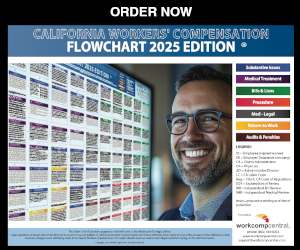Industry Insights
October 29, 2018
Langham: I Am Not Available
- State: Florida
- - 0 shares
I had a recent inquiry that returned my attention yet again to the notice of unavailability.

Judge David Langham
Across the state each day, attorneys will file various notices of unavailability in civil and workers' compensation cases. These are essentially statements of dates that a particular lawyer will not be available due to other professional or personal commitments. They are commonly used to advise of vacations, multiple-day trials and medical leave.
The question that arises, however, is why do judges schedule mediations or hearings for dates for which you have filed a notice of unavailability? And, sometimes the secondary question that accompanies this is, what can you do about it?
It is notable that there is no mention of, or reference to, a notice of unavailability in the Rules of Procedure for Workers' Compensation Adjudications. And those rules control process in the Office of Judges of Compensation Claims.
Astoundingly, there are lawyers that remain unaware of that, and they file documents citing other rules, court rules, that are inapplicable. The authority to support this notice practice, if there is any, must lie elsewhere.
An instructive decision was rendered by the Florida Fourth District Court in 2008: Delio v. Landman. There, the defendant complained on appeal that the "trial court erroneously scheduled the trial for a day it knew his trial counsel was unavailable." There, trial was scheduled for a "calendar call," but the defendant did not appear. A "notice of trial" was then sent.
Defendant's counsel "filed a motion to strike notice of trial and/or motion for continuance." This asserted that counsel was not available for the trial as scheduled.
Counsel did not set his motion for hearing, nor were any further orders entered regarding the scheduling.
The trial proceeded as scheduled, and neither the defendant or counsel appeared. After the plaintiff presented his unopposed evidence, a judgment was entered in plaintiff's favor for $34,936.99. The appellate court concluded that "there was no abuse of discretion in the trial court's scheduling the case for trial." It found fault with the defendant's counsel failing "to attend calendar call, timely file his notices of unavailability for trial and obtain a stipulation or court order for continuance of the trial."
The court explained that "a notice of unavailability is a useful pleading for apprising the court and the parties of potential scheduling conflicts and for assisting them in efforts to accommodate counsel."
However, a notice of unavailability "is not an adequate substitute for obtaining a continuance order. The notice of unavailability does not divest the trial court of its authority to set trial dates and control its docket."
The court also noted in a footnote that it "found nothing in the Florida Rules of Civil Procedure, Judicial Administration, nor the Local Rules or Administrative Orders of the 17th Circuit which provides for use of a 'Notice of Unavailability.'”
It concluded that, "The use of such a filing seems to be a creation of the bar, and may be helpful in scheduling matters in the trial courts. This court (the appellate court), however, routinely strikes such notices when filed."
Thus, it appears that there is no authority for the notice of unavailability, and as such, filing this pleading does not control the progress of a case.
As a side note, when asked for "authority" by a trial judge, it is uncomfortable for an attorney to admit he knows of none. Certainly, such a notice provides information, which if seen by judicial staff might assist a trial tribunal. However, searching a case docket for such conflicts might well consume a great deal of judicial or staff time when scheduling.
Having considered the court's logic in Delio, one might next ask the question: What is the appropriate procedure for counsel? The Fla.R.Pro.Work.Comp. perhaps provide the answer. Rule 60Q6.115(1) essentially says that if a proceeding is not satisfactory in some manner, if a party needs "relief" through a ruling by the judge, then a motion is the appropriate tool. This rule says that "any request for an order or for other relief shall be by motion."
That rule is seemingly consistent with the court's analysis in Delio. The court explained that a notice filed with the tribunal "is not an adequate substitute for obtaining a continuance order." The court did not fault counsel for filing the objections to, and motions regarding, that trial date. The court faulted counsel for neither obtaining an order on those motions/objections or setting them for hearing to obtain an order.
It is up to counsel to (1) make conflict known (file a motion) and (2) to obtain relief by order (with or without a hearing). This follow-through would seem preferable to instead having to inform a client, "You have to pay $34,936.99 because we did not show up for trial," or worse.
There are critical lessons in Delio. First, filing (a notice or motion) alone does not protect a client's rights in some instances. Certainly, filing is a start for a process, but it may not be the end.
Second, there is simply no authority for a notice of unavailability, and thus the authority of the trial tribunal is not somehow truncated by such a filing. That is not to say a lawyer cannot file such a notice, but such a notice may accomplish nothing.
Finally, when the workers' compensation question is "What do I do?" or "What do I do next?" it is quite probable that the answer is file a motion.
The notice circumstance is interesting and curious. It appears, as the appellate court noted, that over time practices and habits become ingrained. Lawyers would be well-served to periodically question their own practices, that is, "Why do we do this in this manner?" and perhaps even, "What is the authority for this practice?"
Such periodic introspection and consideration might well save confusion and consternation.
David Langham is deputy chief judge of the Florida Office of Judges of Compensation Claims. This column is reprinted, with his permission, from his Florida Workers' Comp Adjudication blog.
Advertisements
Columns
- CAAA: Fireworks Warehouse Blast Exposes Flaws in Safety, Oversight, Accountability 07/16/25
- Gelman: Asbestos Ban Is a Win for Workers 07/14/25
- Snyder: Mediation Confidentiality 07/11/25
- Snyder: Settle and Sue: Don't Let It Happen to You 07/09/25
- Kamin: State Senate Committee to Consider SIBTF Bill 07/07/25
- Anders: Self vs. Professional MSA Administration: Which Is Right for the Injured Worker? 06/30/25
- Geaney: Court Affirms Finding of Police Officer's Joint Employment 06/27/25
- Fricker: A New Era for Comp Subrogation 06/25/25
- Kamin: AI for HR Equals Bad Injury Reporting 06/20/25
- Montgomery: Will DWC Ignore New Law? 06/18/25
- Kamin: 4th DCA Clarifies DOI From Date of Knowledge 06/16/25
- Wade: Are the Old Ways Gone? 06/13/25
- Snyder: Trust Your Intuition 06/12/25
- Montgomery: DIR Director Reportedly Resigning 06/11/25
- Gelman: Supreme Court to Review COVID Compensability 06/06/25
- Paduda: WCRI's New Studies 06/05/25
- Moore: 187 Pages of WCRI State Stats 06/02/25
- Paduda: The Gutting of NIOSH 05/30/25
- CAAA: Left in the Smoke 05/28/25
- Gelman: Intentional Wrong? 05/27/25
Now Trending
- Workers' Compensation News
-
Calif. LAO: Second
Injury Fund 'No Longer Aligned'
With Legislative…
Posted on Jul 14, 2025
-
Calif. City Sues
Ex-Cop Accused of Comp…
Posted on Jul 11, 2025Michael Hemming says: “Back when I handled criminal defense I represented a few clients accused…”
-
Calif.
Commissioner Approves 8.7% Rate
Increase, First Since…
Posted on Jul 15, 2025
-
Calif. CWCI: Data
Doesn't Support Presumption for
Hospital…
Posted on Jul 9, 2025
-
Calif. Committees
Pass Presumption, SIBTF…
Posted on Jul 11, 2025
-
Calif. QME Exam
Scheduled for…
Posted on Jul 16, 2025
-
Calif. WCIRB Posts
Agenda for 2025…
Posted on Jul 11, 2025
-
R.I. Split Supreme
Court Upholds Grant of Duty
Disability Pension for State…
Posted on Jul 16, 2025
-
Miss. Truck Driver
Found Dead in Cab, but Family
Doesn't Get…
Posted on Jul 11, 2025
-
Mont. Fire
Marshal's Claim Survives State
Fund's Bid for Summary…
Posted on Jul 10, 2025
Jobs
Upcoming Events
Sep 2-4, 2025
San Diego Elevate Workers' Com
We are thrilled to announce that Early Bird registration is OPEN for ELEVATE« 2025! This year's …
Social Media Links
c/o Business Insurance Holdings, Inc.
Greenwich, CT 06836




No Comments
Log in to post a comment